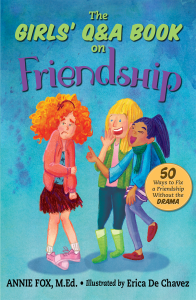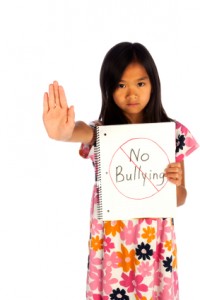|
|
March 25, 2014
 We can be mean to her and still be nice, can’t we? “Do unto others” makes no sense to middle schoolers. (Ideally it should, but that’s not how TweenWorld currently operates.) To help our kids navigate the turbulent and toxic waters of peer relationships, we’ve got to wake up and smell the reality stinking up their world (online and off).
Of course both girls and boys have middle school friendship woes. And yes, both boys and girls can become Peer Approval Addicts. But girls often take their feelings of hurt, jealousy, betrayal and rejection to dramatic and damaging heights. So let’s talk about girl friendships.
The social garbage girls throw at each other is the stuff of rumors, gossip, harassment, and exclusion. And it often happens under the radar. Because even though a girl may be eviscerating a former bff at school and online, she still wants to think of herself as a nice girl. (I said it was twisted, didn’t I?)
 50 Ways to Fix a Friendship without the DRAMA I wrote The Girls’ Q&A Book on Friendship for 8-12 year olds and the adults who care about them. Let’s face it, parents are rarely aware of what’s going on on the battlefield of their daughters’ friendships. It usually comes to light when their girl feels victimized and can no longer contain her distress. At that moment she may spill the whole story of her so-called friend’s bad behavior. In response a parent might logically advise:
“Tell her how you feel about this. Tell her she’s got to stop.”
“I can’t tell her that!”
“Why not? It’s true!”
“Because it will hurt her feelings!”
“Excuse me!? You won’t tell her she’s hurt you because you don’t want to hurt her feelings?! What about your feelings?”
“Forget about it, Mom/Dad. I’m sorry I said anything. You just don’t get it.”
Bingo! Parents can’t fathom the logic here. But to the girl, the logic is clear. She will swallow her pain because she (justifiably) fears that complaining about bad treatment will cause her friend and all the others in their friendship circle to ditch the plaintiff, swiftly and completely. Our targeted daughter will be friendless and she knows it. And because that is a fate worse than death she puts up with the ongoing abuse. Pretends it doesn’t hurt. Continues to think of these girls as her friends and continues to hang out with them and be abused.
Her confusion over the love-hate/comfort-pain mix may cloud her judgment when she starts dating. If she puts up with emotional abuse in a friendship why assume she’ll choose a thoughtful caring romantic partner over one who dominates, demeans and controls?
As parents we need to help our daughters develop enough self-respect to demand respectful treatment from others, especially those closest to them. Let’s help them acknowledge the truth of what’s going on in their friendships. We won’t be able to change “mean” girl behavior in others, but we can, at the very least, help our daughters acknowledge that their pain at the hands of friends is real, undeserved and unacceptable. Then we can point out their options:
1. Stay silent. Stick with friends who hurt you and expect more of the same.
2. Talk to them about it and let them know you’re no longer giving them permission to disrespect you. If nothing changes, consider option #3.
3. Take a (permanent) vacation from the drama. Reach out to people who share your values about what it means to be a real friend.
Here’s to Real Friends vs. the Other Kind and to less friendship drama!

August 9, 2013
This week’s email delivered a truckload of back-to-school worries from teens who are shot through with stress hormones and exclamation points. Like this one, from “Anxious!”
Hey Terra,
So I’m starting a new year of school going to 8th grade! Last year I met my bff when she moved here from another state. We instantly connected and had basically every class together.
One day she asked me, “Are we bffl’s?”
I said “Of course!”
She said, “Great! Just making sure!’
When school ended all these thoughts came to mind: “What if she finds new best friends?’ “What if she’s bored with me?” “What if we don’t have any classes together!?”
Before school ended we talked about what if we have no classes together next year she said, “I would beg the counselor and say ‘I need classes with my friend please!!'” We laughed and agreed we’d both do that. But this is my worst nightmare: ‘What if we drift apart?!’
School starts in 3 weeks! I’m really excited but scared because I don’t wanna let go of our friendship because I just feel really comfortable with my bff and can talk about anything with her! What if I have no classes with her?! I’m sure the counselor won’t change my schedule just for that!
Anxious Almost 8th Grader
 Let the future write itself Dear Anxious,
I’m really sorry to hear you’re so worried about what might happen when school starts. It would be much more fun to enjoy the rest of the summer instead of stressing about this friendship. Do you know that worrying is actually a choice? And you can choose not to do it? It’s true. You may not be able to control every thought that pops into your head, but you can learn to notice when you’re thinking those worrying thoughts and choose to take slow deep breaths and put the brakes on before you get yourself so upset you can’t think straight.
You seem like a very smart girl, so here’s a fact to insert into that intelligent brain of yours: The stuff you’re imagining is not a predictor of the future. But the more you let those worrying thoughts swirl around inside your head the more real they seem. But they’re not real. The stuff you’re worrying may never happen the way you are imagining it. If any of it happens, it won’t turn out to be the terrible thing you are imagining.
Have you ever read a really exciting book and just couldn’t wait to find out what happens so you peeked ahead? You can do that with a book because the story has already been written. Even though you may only be on page 87, the “future” of the characters is planned and plotted and written right down to the last word. If want to peek ahead to page 90, you can read how things turn out. But your life isn’t a book. Your future isn’t written yet and it won’t be until it becomes Present Time. Do you understand what I’m saying, sweetie? You are worrying a lot about what’s going to happen this coming school year. But if “My 8th Grade Year” were a book and you peeked ahead all you would see are blank pages.
Right now, you are choosing to make up a bunch of stuff to go on those blank pages. You are filling pages with all the unpleasant things you are imagining: “What if she finds new best friends?” “What if she’s bored with me?” What if we nave NO classes together?!” Since you have such a good imagination, why not make up some pleasant stuff? That’s a choice too!
Or you can do this. Talk to your friend about what you’ve been worrying about. Share the feelings. Make an agreement that whatever happens in 8th grade, that you two will talk about it and work together to figure it out… that’s what real friends are for.
I hope this helps.
Now try to enjoy the rest of your summer vacation.
In friendship,
Terra

January 26, 2013
I’ve been getting an awful lot of email lately from teens who feel abandoned by their bff. Usually the situation involves a “new girl” coming into the picture who is “stealing” a friend. If this has happened to you (or someone you know) maybe this teen’s email and my answer to it will be helpful. I hope so!
 How come she doesn't want to be my friend anymore? Hey Terra,
Me and “A” have been best friends since kindergarten and we are now in high school. In 7th grade, she started hanging out with this girl named “B.” Now “A” is with “B” all the time. “A” always has her FB status saying she’s “hanging out with my bestie” when she’s with “B.” I feel really jealous and sad. I feel like I shouldn’t be upset because she has the right to be friends with whoever she wants, but it still really hurts my feelings because I feel like she’s replaced me with someone who doesn’t like me. Any input to this would be great!
Ex-BFF
Dear Ex-BFF,
You are right when you say, “‘A’ has the right to be friends with whoever she wants.” And even though your head knows that this is true, your heart “still really hurts” because you miss the closeness you and “A” used to have. Because you don’t yet have another friend to share that same level of closeness with, you feel “jealous” and left-out. I understand.
Sometimes friends outgrow the friendship they have at the same time. Both friends, without saying as much, just start spending less and less time together. It doesn’t usually cause much hurt this way because both friends, for whatever reason, have turned their attention to other things and/or other people. But in this case, it sounds like “A” outgrew the friendship before you did. So you were left feeling “Hey! Come back! I don’t like being here without your friendship!”
My best advice is to try thinking of it this way: This wonderful, long-term friendship you had with “A” has given you many gifts. You two have had lots of great times. Laughed together. Shared secrets. Learned how to negotiate differences of opinions. Learned how to be honest with each other. Through your friendship with “A” you have learned so much about yourself. And one very important thing you’ve learned is what it means to be a great friend. You now have that skill and it’s yours, forever. Now’s the time to: a) Thank “A” for what she’s given you. b) Say goodbye to this phase of your friendship with “A.” You two may become close again in the future, but for now, this chapter has ended. And c) Take what you have learned about friendship and reach out to some new people. You have everything you need to create new friendships which will bring you more wonderful gifts.
Smile. It’s OK. I hope this helps you enjoy the rest of your weekend and the rest of the school year.
In friendship,
Terra
Hey Terra,
Thank you soo much for explaining it like that to me, it makes me feel much better about this situation.
Happier now
Dear Happier Now,
I’m so glad to have helped. Have fun.
In friendship,
Terra

November 27, 2012
I originally wrote this article for TakePart.com where I write a weekly education post. Check out the rest of my articles there.
 Get the message? Got it? Good! Whenever I communicate from a school stage or from my computer, I tell students that our choices should reflect the kind of people we really are. Most of us are good people who care about others. We have a strong sense of fairness. We like to be helpful. We try to understand the other person’s point of view.
Very few of us are truly “mean.” And yet, we often exhibit downright mean behavior (online and off). Whenever I get the chance, I challenge students to think about why that’s the case. I also challenge them to stand up for what’s right, acknowledging that it’s not always easy, especially when no one is standing with you.
Most kids older than the age of five, really do know the difference between right and wrong. But they don’t always do the right thing. Our 21st-century culture of cruelty coupled with a sense of entitlement has taught kids (and many adults) that looking out for anyone but themselves is a sign of weakness.
More: What Every Parent Should Know: How to Help Your Kids Deal With Peer Conflicts at School
Going out of one’s way to be nice to a popular kid, however, will likely earn a student some popularity points of his/her own. But being kind to an “underdog,” especially when popular kids are watching, well, that can be a high-risk move. So can turning down a demand from another student to copy from one’s test paper or refusing to cheat in other ways. And so, kids may feel stuck between their natural inclinations to do the right thing vs. doing whatever it takes to be liked or to get ahead.
We’ve taken a tunnel vision approach to school for long enough, with most of our resources going toward test taking. What’s the point of education without a focus on improving one’s character? Parents and teachers need to make a concerted effort to help students develop the social courage it takes to stand up and be moral leaders. How? Well, here’s an excerpt from my book Teaching Kids to Be Good People, that shows a simple way for us to begin lessons in social courage.
Share this quote with students: “The time is always right to do what is right.” — Martin Luther King, Jr.
Ask, “What do you think about this? Is it true? Too simplistic?”
Talk about a time when you or someone else was being treated unfairly and you stepped up and did the right thing. What happened?
Talk about a time when you didn’t help promote respect, peace, and fairness. What held you back?
Create a challenge to increase acts of social courage. You’ll need paper strips (11 x 2 inches), tape, and a pen.
- Think about a time you stepped up and did the right thing when someone needed a friend or a message of peace. Write a sentence about what you did on a strip of paper and sign your name.
- Connect your strip with someone else’s and create “links” using tape.
- Got more than one act of social courage? Make another link!
Each day keep adding to the chain by actively looking for opportunities to be “brave” in situations where someone needs to do the right thing. As a group, talk about any positive changes you notice in yourself, your family, your school.
 — Older Posts »
| |
















